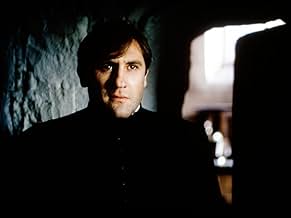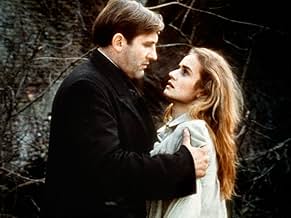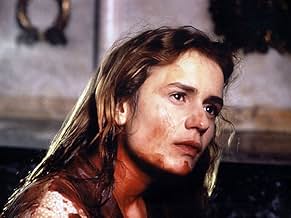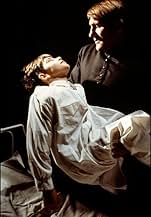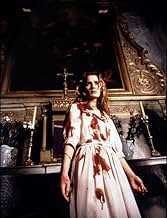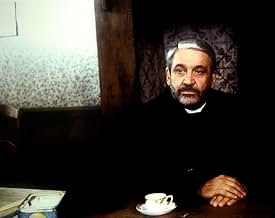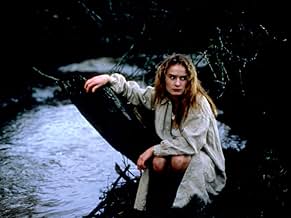Agrega una trama en tu idiomaA priest stuck in a rural congregation and burdened with his overwrought spirituality, finds purpose in a troubled woman accused of murder.A priest stuck in a rural congregation and burdened with his overwrought spirituality, finds purpose in a troubled woman accused of murder.A priest stuck in a rural congregation and burdened with his overwrought spirituality, finds purpose in a troubled woman accused of murder.
- Dirección
- Guionistas
- Elenco
- Premios
- 2 premios ganados y 7 nominaciones en total
- Havret
- (as Pierre d'Hoffelize)
- Mr. et Mme de Wamin
- (as Bernard et Yolande de Gouy)
- Mr. et Mme de Wamin
- (as Bernard et Yolande de Gouy)
- Dirección
- Guionistas
- Todo el elenco y el equipo
- Producción, taquilla y más en IMDbPro
Opiniones destacadas
Bernanos wrote the book after the Great War when French people; instead of mourning the dead or contemplating the barbarity they had just undergone, indulged in lust, fun and celebrations. The author indirectly points out the way the Roaring Twenties deafened humanity from the calls of the grace. As a fervent Catholic, he deplored the 1905 new laicity law and the way rationality inherited from the Kantian revolution and psychoanalysis, prevented priests from operating in what he described as "the bleak battlefield of our instincts" (the war that would never stop).
I mentioned Bergman, Maurice Pialat channelled the introspective "Winter Light", also about a priest caught in a faith crisis. But Bernanos' hero Donissan (played by Gérard Depardieu) believes in God, his struggle is more complex: his life reduced to petty rituals and confessional's confidences, his mind became a regular depository of human crasses he couldn't get rid of. Ironically, he's in a situation where he must keep his flock close, but his enemy (Satan) closer. Full of insecurity, he poignantly admits his failure to find the right language with Abbot Menou-Segrais (Maurice Pialat). He flogs himself regularly to expiate his own powerlessness.
And I couldn't see anyone but Depardieu as Donissan. With his broad shoulders and towering presence, Depardieu has always been a force of nature capable to play larger-than-life and flamboyant characters but there's something inherently instinctive in that man who learned acting from the scratch, without any Academical background, spontaneous at the risk of stumbling on a word, starting a sentence he wouldn't finish or just being silly. The power of Depardieu is that even his his oafishness could move audiences. Fittingly so, Donissan was a man who acknowledged his intellectual limits, but had the faith that moved mountains.
There's a second subplot with Mouchette, a sixteen-years old teenager who announces her lover that she's pregnant. The merit of Mouchette is to draw Donissan's torments in flesh and blood, preventing the story to get stranded in abstractions. She enjoys being beautiful and desired, much more by handsome men. She doesn't embody sin but embraces it as the lesser of two evils. Indeed, she hates her condition; daughter of a peasant, as mediocre a politician as a brewer, surrounded by hypocrites who lust on her body but would never make it worth ruining their little lives. Not only have men failed to elevate her but they wouldn't even join her in a stylish and assumed degradation.
Mouchette becomes the instrument of her own vengeance toward the human genre... including herself. And Sandrine Bonnaire was perfect, with her frail petite frame and yet eyes that contained more passion and strength than all the male characters combined. The story is driven by Donissan et Mouchette and when the two meet: it's the ultimate convergence of two souls that were lost for different reasons ... but as close as they were, literally, they had went just too far in their own journey to reach one another.
Now, there's a third important player in the film, a man Donissan meets during a long walk across the countryside, he's played by Jean-Christophe Bouvet, Pialat knows how to use a blatant 'Day for Night' effect with deliberately exaggerated blue and pale tones to convey the supernatural aspect of that crucial encounter. He isn't exactly a fancy director but he knew that epiphanic moment needed an extra-surrealistic push, visually. The rest of the film is more sober even in the passionate moments.
There is a lot of dialogue between Pialat and Depardieu but they never sound as on-the-nose or expositional material, the reason is simple: these men are priests, they're used to listen and they're used to silence, they can either process their thoughts or explain how they can't, all in a very soft voice, that befits their status but also establishes an unconscious resignation for failure in a world where the Catholic church had lost its grip on people. There's an important moment where Menou-Segrais makes Donissan (too honest to deny) admit he put himself in the hand of someone he didn't have esteem for. The abbot knows he lives in bourgeois semi-idleness he wouldn't trade for all the mental torture of the world. But Donissan is capable of passion (in the 'pathos' sense): he whips himself, shouts at Mouchette, raises a dead corpse with that strength and body language that elevate even his silent moments to sheer eloquence.
"Under the Sun of Satan" earned France its second Golden Palm twenty years after "A Man and a Woman", meeting with furious boos from audiences who wished it was "Wings of Desire", I couldn't be more satisfied by that outcome for Wenders' film that dealt with similar themes but with flashy artsy stuff to conceal its skeletal story. Pialat took up a higher challenge and made a film I just wish directors like Ingmar Bergman or Martin Scorsese saw it.
Getting his Golden Palm, he raised his fist and said "if you don't like me, I don't like you either", I always thought this was anger speaking, after seeing the film and hearing the director speak about it, I think it was exhaustion and maybe frustration of not having reached his audience just like Donissan with his people... and he was humble enough to appease the tension afterwards.
Still, one of the most famous moments of Cannes' history, a unanimous but controversial win, but a deserved win nonetheless.
We see nothing of the parochial trials, and sickness, endured by Bernanos' Curé de campagne (Robert Bresson's film), faced with hostility and mockery from his villagers. The two traumatic events (Mouchette cutting her throat, and a dying boy "coming to life" in the priest's arms) shock us, but do not form an integral part of the curate's spiritual day-to-day experience. They are merely sensational. Depardieu is not convincing as an agonised believer. Yet, in the spontaneous sincerity of his accompanying interview, he appears to draw inspiration from Augustine!
Having not read the original novel, I couldn't say how much is from the original and how much is from the film itself. But despite being from the 1920s, the story has a very modern feel to it. It could be the 1920s, the 1980s or even the 2010s.
There is that constant play between faith, conviction and organization. And it need not be the Catholic Church. Any organization, religious or secular, will have its passionate members who want to do something more. This is a very nice examination of that, and really showcases what made Depardieu an international star.
The best scene in the film is when Depardieu comes across Satan -- chilling.
¿Sabías que…?
- TriviaWhen the movie was announced as the winner of the Palme d'Or at the Cannes Film Festival, with the jury declaring that it was an unanimous vote, the audience, who expected Las alas del deseo (1987) to win, booed when the director Maurice Pialat was on his way to the stage to receive the award. Pialat's response to this was to raise his fist, replying: "If you don't like me, I don't like you either".
- Citas
[first lines]
Donissan: With you, everything looks easy. Alone, I'm useless. I'm like the zero, only useful next to other numbers. Priests are so miserable. They waste their lives seeing God being ignored. People make jokes on us. We're like those walls where people write obscenities.
Menou-Segrais: You're tired.
Donissan: Tired? I'm not tired. Tired is a bad thought.
Menou-Segrais: Suspend your visits.
Donissan: Those visits do more harm than good. In the beginning, I didn't know evil. I learned it from the mouths of the sinners.
Menou-Segrais: No one knows better than a priest about the terrible monotony of sin.
Donissan: I can't speak to them. I can't only make absolutions and feel sorry.
Menou-Segrais: If one absolution in thirty was worthy, the world would be brief.
- ConexionesFeatured in Les cent et une nuits de Simon Cinéma (1995)
Selecciones populares
- How long is Under the Sun of Satan?Con tecnología de Alexa
Detalles
- Fecha de lanzamiento
- País de origen
- Sitios oficiales
- Idioma
- También se conoce como
- Under the Sun of Satan
- Locaciones de filmación
- Productoras
- Ver más créditos de la compañía en IMDbPro
Taquilla
- Total en EE. UU. y Canadá
- USD 68,765
- Fin de semana de estreno en EE. UU. y Canadá
- USD 6,987
- 22 ene 1989
- Total a nivel mundial
- USD 69,688
Contribuir a esta página


![Ver Trailer [English SUB]](https://m.media-amazon.com/images/M/MV5BZDhmMWVjNGItMWM0NC00NmUzLTk5NmQtNDM4NjBjM2JjNjJmXkEyXkFqcGdeQXRyYW5zY29kZS13b3JrZmxvdw@@._V1_QL75_UX500_CR0)
